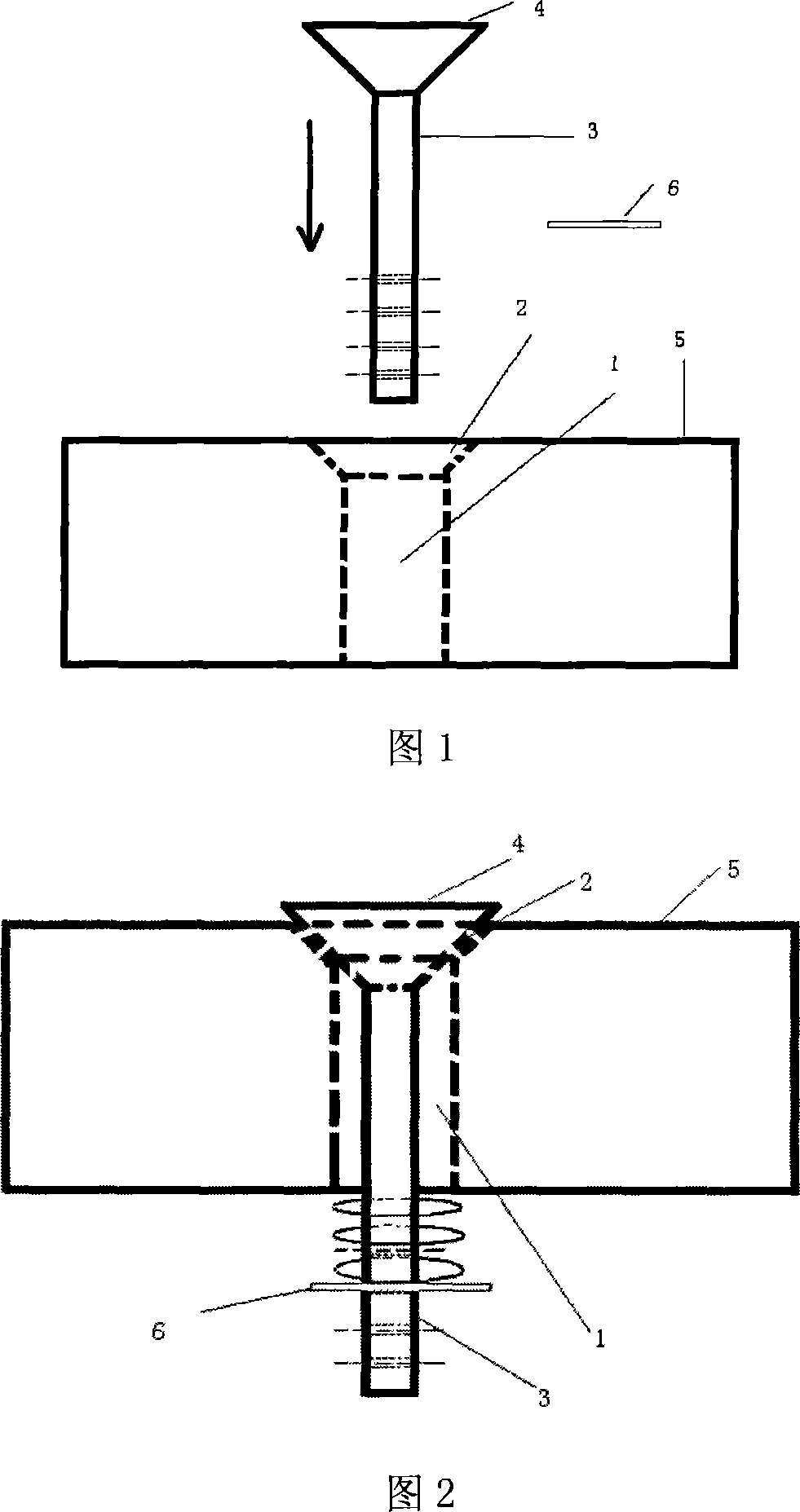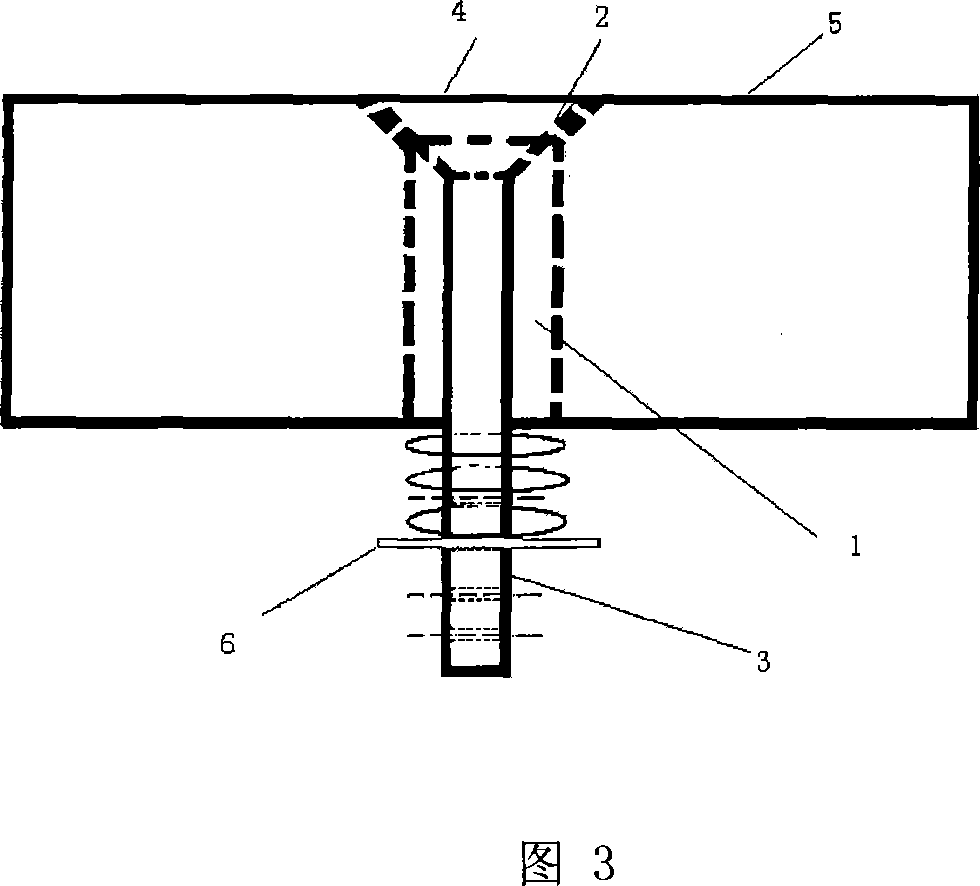Back penetration measuring method for film base binding performance
A technology that combines performance and measurement methods, applied in the field of measurement, can solve problems such as complex prefabrication of parts to be tested, substrate systems limited by silicon materials, etc.
- Summary
- Abstract
- Description
- Claims
- Application Information
AI Technical Summary
Problems solved by technology
Method used
Image
Examples
Embodiment 1
[0026] Step 1: Machining a round through hole 1 with a radius of 1.5mm on a substrate with a size of 40mm×20mm×5mm, and machining a chamfer 2 of 45° as shown in FIG. 1 on the through hole.
[0027] The second step: process a matching ejector pin 3 . As shown in FIG. 2 , the top end surface 4 of the ejector rod in the assembled base system is 0.75 mm higher than the base coating surface 5 , and the coating surface is ground as shown in FIG. 3 . Ensure that the coating surface is flat and smooth.
[0028] Step 3: Cover the lower end of the ejector rod with a spring with a radius 0.5 to 1mm larger than that of the base hole and have a higher rigidity. Between the plug pin 6 and the base, thus making the ejector pin and the base in a tight contact state. This is because when the film-based system adopted in the present invention is polished on the coating surface, the ejector pin is likely to shake, which affects the flatness of the coating surface, thereby affecting the integri...
Embodiment 2
[0034] Step 1: Machining a round through hole 1 with a radius of 1.5 mm on the base of the component to be tested, and machining a chamfer 2 of 35° as shown in FIG. 1 on the through hole.
[0035] The second step: process a matching ejector pin 3 . As shown in FIG. 2 , in the substrate system after assembly, the top end surface 4 of the ejector pin is 0.5 mm higher than the coating surface 5 of the substrate.
[0036] Other steps are with embodiment 1.
[0037] Step 5: Load in the form of dynamic load at the lower end of the ejector rod. Under a certain number of dynamic loads, the membrane will deflect to a certain extent. The oil immersion method can be used to measure the The measured area radius of the detached base area can be used as the fatigue crack growth length of the membrane, and thus the fatigue crack growth length of the membrane under different loading cycles can be obtained, which characterizes the fatigue performance of the membrane.
[0038] In this embodim...
Embodiment 3
[0040] Step 1: Machining a round through hole 1 with a radius of 1.5 mm on the base of the component to be tested, and machining a chamfer 2 of 85° as shown in FIG. 1 on the through hole.
[0041] The second step: process a matching ejector pin 3 . As shown in FIG. 2 , in the substrate system after assembly, the top end surface 4 of the ejector pin is 1 mm higher than the coating surface 5 of the substrate.
[0042] Other steps are with embodiment 1.
[0043] Step 5: Load in the form of dynamic load at the lower end of the ejector rod. Under a certain number of dynamic loads, the membrane will deflect to a certain extent. Under the acoustic emission microscope, the corresponding measured values for different cyclic loading times can be obtained. The measured area radius of the detached base area can be used as the fatigue crack growth length of the membrane, and thus the fatigue crack growth length of the membrane under different loading cycles can be obtained, which charac...
PUM
| Property | Measurement | Unit |
|---|---|---|
| radius | aaaaa | aaaaa |
Abstract
Description
Claims
Application Information
 Login to View More
Login to View More - R&D
- Intellectual Property
- Life Sciences
- Materials
- Tech Scout
- Unparalleled Data Quality
- Higher Quality Content
- 60% Fewer Hallucinations
Browse by: Latest US Patents, China's latest patents, Technical Efficacy Thesaurus, Application Domain, Technology Topic, Popular Technical Reports.
© 2025 PatSnap. All rights reserved.Legal|Privacy policy|Modern Slavery Act Transparency Statement|Sitemap|About US| Contact US: help@patsnap.com



